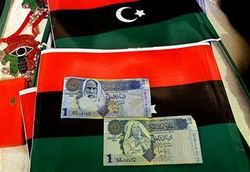 Tripoli
Tripoli
Two months ago Mazin Ramadan, senior advisor to Ali Tarhuni, the oil and finance minister recently promoted to deputy prime minister, was, in his own words, fire-fighting a liquidity crisis in Benghazi. Today, after the first tranche of the £1.8 billion frozen Libyan dinars sitting in Britain finally reached Libya after five months, he’s feeling more relaxed. It arrived in the nick of time. Another reason for his bonhomie? He says he’s just received $300 million in frozen assets released by the US.
The most immediate challenge is tomorrow. Literally. The million dinar question is whether Tripoli goes back to work on Saturday. On paper it’s the first day for civil servants to return to their desks. Will Tripolines vote with their feet and send out a compelling message to the world that it’s business as usual?
The general mood, shared by almost every observer here, is so far so good. Ramadan, a director of the Temporary Financing Mechanism that has helped keep the revolution, its fighters and their families afloat these past few months, says he was expecting to inherit a “complete mess” on the fall of Tripoli. Yet, on the contrary, the documents and paperwork he anticipated having disappeared have been guarded and preserved. “It’s a lot better than I expected.”
“By Tuesday or Wednesday if things go smoothly, we’ll have made good progress and it’ll start to look a lot more normal,” he says. “I’m very optimistic.”
The 1 billion Libyan dinar national monthly pay-roll the National Transitional Council is suddenly responsible for is straightforward, he says. “The first thing we did when we got to Tripoli was secure the banking system. It’s working.” An estimated 200 million to 220 million Libyan dinars remains in the central bank, presumably hidden from the Gaddafi kleptocracy by the authorities.
Ramadan is clear on what the next priority is. “Money, money, money. I just hope the international community understands that better now.” The military war is largely over. The struggle on the financial frontline continues.






Comments